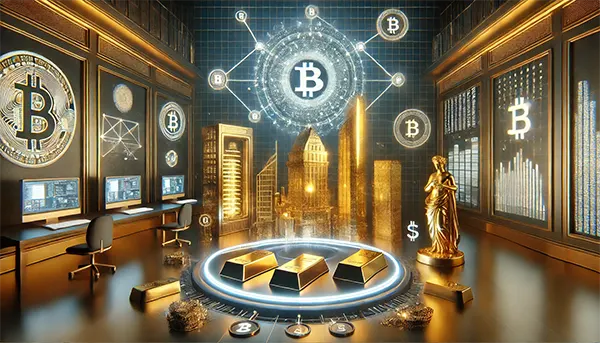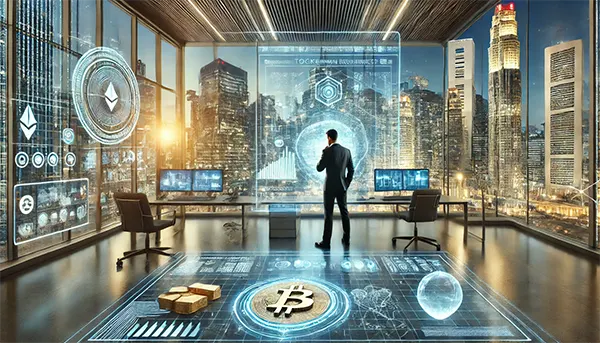
What is RWA (Real World Assets) in Cryptocurrency and Why is it a 2025 Trend?
The concept of Real World Assets (RWA) tokenisation has gained significant momentum in recent years, with 2025 poised to be a breakthrough year for this emerging trend. The ability to digitise physical assets, such as real estate, luxury goods, and financial securities, is transforming the crypto market and bridging the gap between decentralised finance (DeFi) and traditional investment opportunities.
Tokenisation allows individuals to invest in high-value assets without requiring full ownership, increasing accessibility and liquidity. This shift is not only reshaping investment strategies but also prompting discussions on regulatory frameworks and legal considerations worldwide. With institutional investors entering the space and blockchain infrastructure advancing, RWA is set to become a core pillar of the digital asset economy.
Understanding RWA: How Do Real World Assets Work in Crypto?
Real World Assets (RWA) refer to physical or financial assets that are represented as digital tokens on a blockchain. These assets can range from tangible property like real estate and art to financial instruments such as government bonds, stocks, and commodities. By leveraging blockchain technology, RWA tokenisation enables fractional ownership, automated transactions, and enhanced transparency.
At its core, RWA tokenisation involves converting asset ownership into blockchain-based digital tokens. These tokens are secured through smart contracts, which enforce rules regarding transferability, dividends, and compliance. This process eliminates the need for intermediaries such as banks or brokers, making asset transactions more efficient and cost-effective.
One of the most significant advantages of RWA is liquidity. Traditional assets, like real estate, require time-consuming procedures for buying, selling, and transferring ownership. Tokenised assets, however, can be traded instantly on decentralised exchanges, providing investors with greater flexibility and liquidity options.
The Key Advantages of RWA in the Crypto Space
As more industries explore the benefits of blockchain integration, RWA is gaining popularity for its ability to unlock value from traditionally illiquid assets. Here are some of the primary benefits of RWA in the crypto space:
1. Increased Market Accessibility – Tokenisation enables investors to own fractional shares of high-value assets, making markets more inclusive. Instead of needing millions to invest in real estate or fine art, users can buy small fractions of these assets using blockchain technology.
2. Lower Transaction Costs – Traditional asset transfers often involve multiple intermediaries, resulting in high fees. RWA eliminates these middlemen, allowing for direct transactions that reduce costs while improving speed and efficiency.
3. Enhanced Transparency and Security – Every transaction involving RWA tokens is recorded on a public blockchain, ensuring full transparency. Smart contracts automate compliance measures, minimising the risk of fraud or mismanagement.
The Most Popular RWA Tokenisation Projects
Several innovative projects are leading the way in RWA tokenisation, offering real-world use cases that validate the concept’s practicality. These platforms are shaping the future of blockchain-powered asset management.
One of the most prominent projects is RealT, a platform that tokenises real estate properties in the United States. Investors can buy fractional shares of rental properties and receive rental income in the form of cryptocurrency, offering a passive income stream through blockchain.
Another significant player is Securitize, a regulatory-compliant platform that enables the tokenisation of private securities, bonds, and equities. It provides institutional-grade solutions for investors looking to gain exposure to blockchain-based assets.
How Real Estate Tokenisation is Changing Investment Strategies
Real estate investment has traditionally been a privilege of high-net-worth individuals due to the capital-intensive nature of the market. Tokenisation is changing this dynamic by making real estate more accessible to retail investors.
Platforms such as Lofty AI and RedSwan allow individuals to buy fractional shares in properties, earning rental income based on their holdings. This model not only provides liquidity but also reduces entry barriers for investors.
Moreover, tokenised real estate assets can be traded on secondary markets, offering an exit strategy that traditional property investments lack. This flexibility is particularly attractive to younger, tech-savvy investors looking for diversified investment opportunities.

Regulatory Landscape of RWA in Different Countries
While RWA presents numerous advantages, regulatory concerns remain a critical factor in its widespread adoption. Different countries have varied approaches to tokenised asset regulation, creating both opportunities and challenges for global investors.
In the United States, the Securities and Exchange Commission (SEC) has taken a cautious yet progressive stance on digital assets. Any tokenised security must comply with existing financial laws, requiring RWA projects to register as securities offerings.
Europe is taking a more structured approach with the introduction of the Markets in Crypto-Assets (MiCA) regulation. This framework aims to provide clear legal guidelines for digital assets, fostering an environment where RWA projects can operate with greater certainty.
Challenges and Legal Considerations for RWA Adoption
Despite its potential, the adoption of RWA still faces several legal and technical challenges. One of the biggest concerns is the enforceability of blockchain-based ownership in traditional legal systems. For example, if a token holder owns a fraction of a property, how is that ownership recognised in court?
Additionally, cross-border token trading presents regulatory hurdles. Securities laws differ from country to country, making it difficult to create a unified framework for global RWA transactions. As governments develop clearer policies, RWA adoption is expected to accelerate.
Another consideration is smart contract security. While blockchain is highly secure, vulnerabilities in smart contracts can be exploited. Ensuring that tokenisation platforms follow best security practices is crucial for protecting investor funds.
